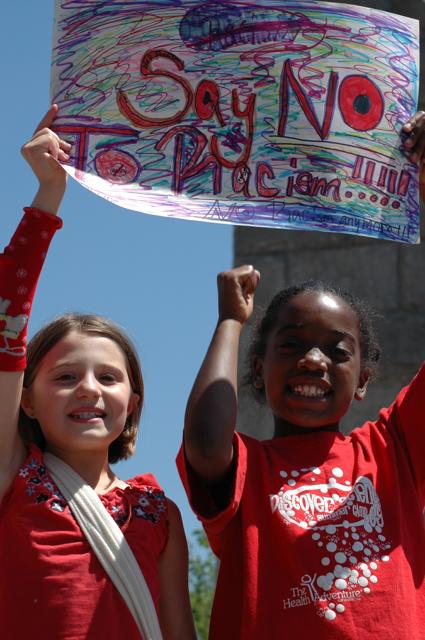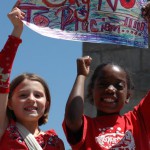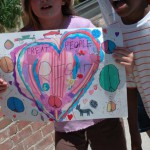- Starting young: Last year’s Stand Against Racism included a children’s march, coordinated by the YWCA. This year’s events have more groups involved than anywhere else in the country. photos by Michael Muller
The YWCA's Stand Against Racism didn’t get its start here, but the Asheville edition is in the national spotlight this year. The YW’s Trenton, N.J., chapter, unveiled the first Stand — a series of community events highlighting cultural diversity and the continuing struggle against racism — in 2007; the concept went nationwide last year.
And Asheville is leading the charge, with more groups (157) signed up to take part than in any other city in the country. Participants include small businesses, nonprofits and activist groups as well as local governments, UNCA, the Asheville Area Chamber of Commerce and Mission Hospitals (see sidebar, “Stand and Deliver”).
“We've gone about it in a different way this year,” says Kathryn Liss, the coordinator for Asheville's Stand Against Racism. “We felt it was important to involve as many people as we possibly can. We made it really easy for people to sign up, and they have.”
Why this level of response now?
“A lot of folks in this community are really, sincerely interested in seeing our relationships around race change,” says Liss. “I frequently run into people who say to me, ‘Where are all the black people?’ We live in a community that’s supposedly diverse, and yet when you walk around downtown, where are all the black people? What is it about Asheville that, despite the large number of African-American children in school and African-Americans who live in this community, we hardly ever see African-Americans in the places that I frequent?”
Liss, who moved here in 1993 and started working for Building Bridges, a nonprofit that focuses on improving racial relationships, recalls being told, “If you want to have other than all-white encounters in this community, it requires being intentional.” And though the latest census data show that more than 20 percent of Asheville's population is either African-American or Hispanic, the racial situation hasn’t changed much.
The hope, she notes, is that having so many partners and facets to this year’s Stand Against Racism will help the issue gain new prominence. The series includes educational events, religious services, community forums, performances and fairs (see sidebar, “Stand and Deliver”).
“We're making a statement that the white folks who are in a position to influence what's happening care enough to stand up and be counted,” Liss explains. “Last fall, there were three incidents of racial harassment in the county. It would be real easy for people to say that people in this community don't care, that they're not interested in making things better around race: They're maybe even interested in making things worse.
“But I don't believe that,” she continues. “I believe there are a great many people in this community that would like to see much easier relationships between black and white. … People are eager to have more connection with people different from themselves, and they don't know how to do it. By participating in something like this, by having this community presence, we are making a statement that we want things to be different.”
Course correction
Asheville native Tim Smith understands the sense of de facto segregation Liss describes. In the past year, Smith’s Drinks and Dialogue gatherings have tackled the questions “Is Asheville segregated?” and “Why is Asheville so segregated?” An April 29 Drinks and Dialogue potluck at the Hole-N-Da-Wall on South Market Street will revisit the topic.
The YWCA, says Smith, approached him about being part of this year’s Stand Against Racism. “I'm already for the cause,” he notes. “We're going to raise this discussion again, and I hope [attract] some new people along with our veterans, so we can get some different opinions.”
“You can feel the shift in Asheville even since we had the first Drinks and Dialogue,” continues Smith. “It seems like people are talking more — they're pushing; they're willing to talk and address these issues. I hope Asheville stands up, and I want people to keep pushing for this to become a more diverse city. We all do wrong, but we can make corrections too.”
In addition to the main public events, each participating group is also organizing something special for its own employees or members. One of the biggest participants, the city of Asheville, will lead employees on a downtown tour highlighting the area's racial and ethnic history. The city's Public Works Building, for example, was built on the site of African-American homes demolished in the name of “urban renewal” in the 1970s.
“The point is to give employees a little more perspective on the history of the places within a stone's throw of City Hall,” explains Special Projects Coordinator Kendra Turner, who organized the tour. Beginning with The Block (the historically African-American neighborhood adjacent to City/County Plaza), the tour will continue down Biltmore Avenue and around downtown. En route, it will also acknowledge the contributions of Asheville's Irish, Jewish, Islamic, Greek and other immigrant populations over the centuries, stressing “how important that influx of immigrant perspective and culture is to keep our community sustainable and thriving.”
In 2010, more than 200 city employees participated in the tours; this year, Buncombe County staffers can participate as well.
A centerpiece event is the Friday, April 29, Diversity Fair at the YMI Cultural Center, smack in the middle of The Block. Featuring group dialogues, videos and presentations, the fair is targeting small businesses and the general public, "to give them the opportunity to participate on a much larger scale than just wearing the [Stand Against Racism] pin," YMI Interim Director Dan Johnson explains. "They can come together and have an open dialogue."
Johnson, who helped organize this year’s Stand, attributes the unprecedented surge in participation to improved coordination and outreach.
"It's the collaborative effort of the organizations here locally," he notes. "We all have a lot to offer — not just the large organizations, but the small companies and groups too. … We've brought partners in — the Chamber is actively involved — we've marketed it in an effective way. The response has been overwhelming: It's a team effort."
— David Forbes can be reached at 251-1333, ext. 137, or at dforbes@mountainx.com.





Have there been any studies to document and analyze how (and if) racism manifests itself in Asheville, how widespread it is, if it is “institutionalized” or personal prejudice on the part of individuals? As the community “takes a stand” against racism, are there data to suggest racism is a problem here and how much of a problem?
You might find this interesting:
http://ywcaofasheville.wordpress.com/2011/04/27/ontrack-stand-againt-racism-op-ed/
Thanks to Ami for the link to the editorial citing statewide statistics about differences in median net worth among white families and African-American and Hispanic families in North Carolina.